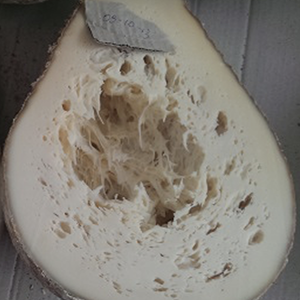 Smart Citations
Smart CitationsSee how this article has been cited at scite.ai
scite shows how a scientific paper has been cited by providing the context of the citation, a classification describing whether it supports, mentions, or contrasts the cited claim, and a label indicating in which section the citation was made.
Late blowing defect in Grottone cheese: detection of clostridia and control strategies
“Grottone” is a pasta filata hard cheese produced in Campania region from cow’s milk and characterized by holes formation due to CO2 development by Propionic Acid Bacteria. The contamination of raw milk with butyric acid-producing spore-forming clostridia represent a major concern for cheese producers since clostridia outgrowth may lead to the cheese late blowing defect during ripening. Detection of clostridial endospores in milk before processing and the use of antimicrobial compounds may represent an important control strategy. The present study is aimed to point out the most suitable procedure for the determination of clostridial spores in dairy samples, and to assess the inhibitory activity of several antimicrobial compounds against Cl. sporogenes. Based on results, MPN counts on Bryant and Burkey medium and CFU on RCM proved to be the most suitable protocols for routine testing. By using these procedures clostridial spores were detected in 10 out 13 milk samples and in all cheeses with late blowing defect. Within antimicrobial compounds, sodium nitrate is still the best choice for preventing late blowing, nevertheless a protective culture of Lacticaseibacillus casei proved to be a promising alternative. Nevertheless, the use of this protective culture in six Grottone cheese productions carried out at farm level, led to unsatisfactory results. Holes’ development was hampered likely for an inhibition of the PAB starter and the expected ‘Grouviera-type’ taste was not perceived by panellists. Based on results, the use of protective cultures needs to be contextualized and interactions with starters needs to be evaluated case by case.
How to Cite
PAGEPress has chosen to apply the Creative Commons Attribution NonCommercial 4.0 International License (CC BY-NC 4.0) to all manuscripts to be published.

 https://doi.org/10.4081/ijfs.2022.10162
https://doi.org/10.4081/ijfs.2022.10162




